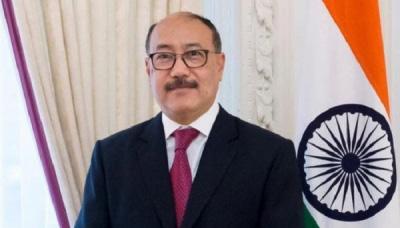
4 minute read
India's foreign policy transformed in last 10 years: Harsh Vardhan Shringlaindian-news-july-2025
New Delhi, July 13 (IANS) Former Foreign Secretary and India’s Ambassador to the US, Harsh Vardhan Shringla, who has been nominated to the Rajya Sabha, spoke to IANS in an exclusive interview on Sunday. He reflected on his transition from diplomacy to politics, expressing gratitude to Prime Minister Narendra Modi for the nomination. Shringla shared his views on India’s evolving global stature under the Modi government.
IANS: You’ve been nominated to the Rajya Sabha. What would you like to say about Prime Minister Modi?
Harsh Vardhan Shringla: I express my heartfelt gratitude to him for entrusting me with such a huge responsibility. I have had a 40-year-long career in diplomacy, and now I look forward to serving the people of this country through Parliament. I am deeply thankful to President Droupadi Murmu and Prime Minister Narendra Modi for this honour.
IANS: How did you come to know about your nomination?
Harsh Vardhan Shringla: The official gazette notification had come out. But before that, Prime Minister Modi personally called me. He didn’t mention what exactly it would be—just that something significant was going to happen and that I would get an opportunity to serve the nation. I never imagined that he would call me himself. During my time as Foreign Secretary and Ambassador to the US, I had the opportunity to work closely under his leadership. But it felt special and humbling that he took the time to make that personal call.
IANS: What’s your view on India’s foreign policy under Prime Minister Modi?
Harsh Vardhan Shringla: If you look at how the world perceives India today compared to 10 years ago, the difference is massive. Today, India is seen with great respect. People around the globe recognise India's leadership in technology, innovation, and digital public infrastructure. Our contributions at the global level are now widely acknowledged. During the COVID-19 crisis, Prime Minister Modi initiated Vaccine Maitri, through which India supplied vaccines to many developing nations. There were countries that had their own vaccines but didn’t share them due to domestic needs or financial concerns. India, on the other hand, rose above that and helped when the world needed it the most. Everywhere PM Modi goes, he is conferred with international honours. That in itself reflects India’s growing stature. I recently visited countries like Kuwait, Algeria, and Bahrain as part of an allparty delegation after Operation Sindoor, and leaders in all these countries praised Prime Minister Modi and appreciated how strong our relationships with Gulf nations have become under his leadership.
IANS: Rahul Gandhi is the Leader of Opposition, but he frequently travels abroad. He is abroad even now. Your comments?
Harsh Vardhan Shringla: Going abroad is one thing, but going abroad and making negative remarks about your own country is quite another. The people of India do not appreciate such behaviour. Criticising the country on foreign soil is deeply unfortunate. During our recent delegations, even opposition leaders accompanied us and stood united for the country. But to raise doubts and speak against the nation—especially at such sensitive times—is not acceptable. After Operation Sindoor, multiple delegations went abroad and sent out a strong message: India stands united.
IANS: Rahul Gandhi has been demanding a debate on Operation Sindoor in Parliament and is calling it “Narendra Surrender.” Your reaction?
Harsh Vardhan Shringla: Such statements are completely baseless. The world has seen how India asserted its strength. Within four days, our military conducted a successful operation with pinpoint accuracy—our BrahMos missiles struck nine terror bases with precision. Pakistan suffered heavy losses. In fact, it was Pakistan that reached out for a ceasefire. NSA Ajit Doval recently made a public statement confirming that there was no damage to Indian assets.










